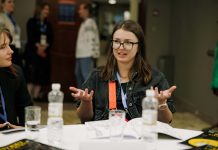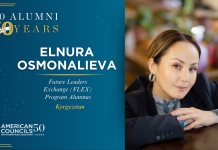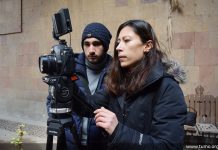‘Do not take what you learned for granted. FLEX has been a dream come true for most of us and you should make sure that your unique experience will benefit society,’ Azat Toroev encouraged his fellow FLEX alumni.
Profile written by Tatyana Movshevich
Azat Toroev (Maratovich) ‘14
Tokmok, Kyrgyzstan / Fort Collins, CO
Education: International University of Central Asia, International Relations
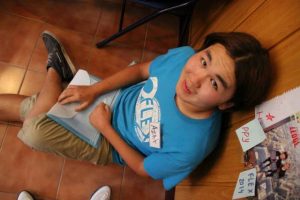 When he returned home after his FLEX year, Azat’s native town of Tokmok, Kyrgyzstan benefited greatly from it. He immediately started organizing unique activities for young people in his community, sharing with them the knowledge and skills that he had gained in America. One of his project ideas was an American football club for local teenagers. At first he didn’t intend for the impromptu meetings to become a club – he simply posted a few ads online inviting young people to learn the rules and throw a football around. After seeing their real interest in learning more, Azat establish a weekly practice.
When he returned home after his FLEX year, Azat’s native town of Tokmok, Kyrgyzstan benefited greatly from it. He immediately started organizing unique activities for young people in his community, sharing with them the knowledge and skills that he had gained in America. One of his project ideas was an American football club for local teenagers. At first he didn’t intend for the impromptu meetings to become a club – he simply posted a few ads online inviting young people to learn the rules and throw a football around. After seeing their real interest in learning more, Azat establish a weekly practice.
We all run into challenges in life – Azat ran into some when organizing his event too.
The Ball: Azat had to travel to the capital of Kyrgyzstan, Bishkek, just to start searching for the football. After looking through dozens, he finally found one.
The Venue: This turned out to be an even bigger problem. The local sports center asked for huge amounts of money to rent the facility for weekly projects. That’s when Azat thought, “Isn’t the government supposed to encourage local initiatives? So I went to the City Hall to talk to the mayor. I have to admit that I was worried that I wouldn’t be taken seriously’. But, contrary to his expectations, the town mayor listened to his project proposal and offered financial help, so that in the end the club got to train, for free, on the same fields that they had initially wanted.
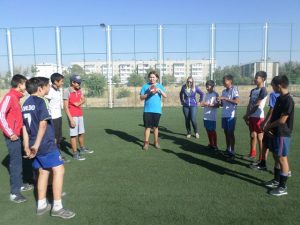 The main motivation for Azat was to see how the spirit of the game changed teenagers: ‘One of our players was a shy boy who was often teased by other kids and seemed to have confidence problems. As soon as he started playing, he blossomed and no longer felt shy or insecure. He had a natural talent for the game and throughout the entire football season, he never missed a practice. He’d call me every Thursday, early in the morning, just to check that the practice was still on’.
The main motivation for Azat was to see how the spirit of the game changed teenagers: ‘One of our players was a shy boy who was often teased by other kids and seemed to have confidence problems. As soon as he started playing, he blossomed and no longer felt shy or insecure. He had a natural talent for the game and throughout the entire football season, he never missed a practice. He’d call me every Thursday, early in the morning, just to check that the practice was still on’.
At the moment Azat is working on another community project – he is creating a social club for children with Down ’s syndrome. He decided to start this initiative after he realized that he had never met any children with this disability in Tokmok and realized that children with Down’s syndrome were simply not involved in any aspects of community life. ‘In my town, people often laugh at people with disabilities – and think that they just do not notice anything. They do and they have hurt feelings just like anyone else does. I know how it feels, because I have a disability myself,’ Azat says.
To start his search to involve children with Down’s syndrome in the project, Azat went to the Social Security Administration Center. He didn’t expect to receive their contact information, but upon explaining the project and his intentions, he received the phone numbers of seven local children. Azat invited all seven to lunch at his house – and only three came. Most of the parents were suspicious. Azat explains, ‘It was a great day when we met. I learned so much and a lot of stereotypes in my own head broke down. I understood that the main problem for people with Down’s syndrome in Tokmok is the lack of social life. My next step is establishing a community club where people with Down’s syndrome can meet local university students and do different activities together, kind of like Big Brothers Big Sisters. I am sure that both sides will benefit greatly from it.’
Fighting prejudices and stereotypes is an essential part of all of his community work. ‘The kids understand, but adults often have strong stereotypes, which they picked up back in their school years. In my opinion, adults in former USSR countries often have problems with critical thinking. What my FLEX experience taught me is how to think outside of the box and break stereotypes,’ he says.
Azat is not scared to express his opinions, which are often seen as pro-Western and which regularly challenge his university professors. Despite disagreements in political and social matters, his teachers and peers value his contribution to university life and mark his work objectively so that Azat remains one of the best students in his freshman class. ‘These debates do not damage my reputation or my grades, but occasionally I feel like a donkey that stands in the way of common opinion,’ he remarks.
![]()
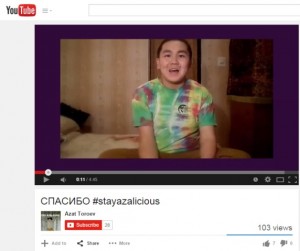 Azat’s biggest dream is to become a world-renowned film director and make movies about Central Asia, its culture, and its issues. At the moment he is making short, often humorous videos about his life, friends and the importance of being an individual. They are funny and light, but many have clear societal messages.
Azat’s biggest dream is to become a world-renowned film director and make movies about Central Asia, its culture, and its issues. At the moment he is making short, often humorous videos about his life, friends and the importance of being an individual. They are funny and light, but many have clear societal messages.
Azat is particularly interested in gender issues and plans to get involved in the global gender equality movement ‘HeForShe’ by making short videos and giving presentations in Tokmok schools: ‘Even though many women who live in rural areas think that they do not experience discrimination, their wages are still drastically lower than men’s. These problems exist not only in Central Asia but in most developed countries as well and are connected with the deeply ingrained stereotypes in people’s heads’.
‘We have a lot of problems here in Tokmok and in Kyrgyzstan in general, but in problems I see opportunities and the ways to change society,’ he says.


